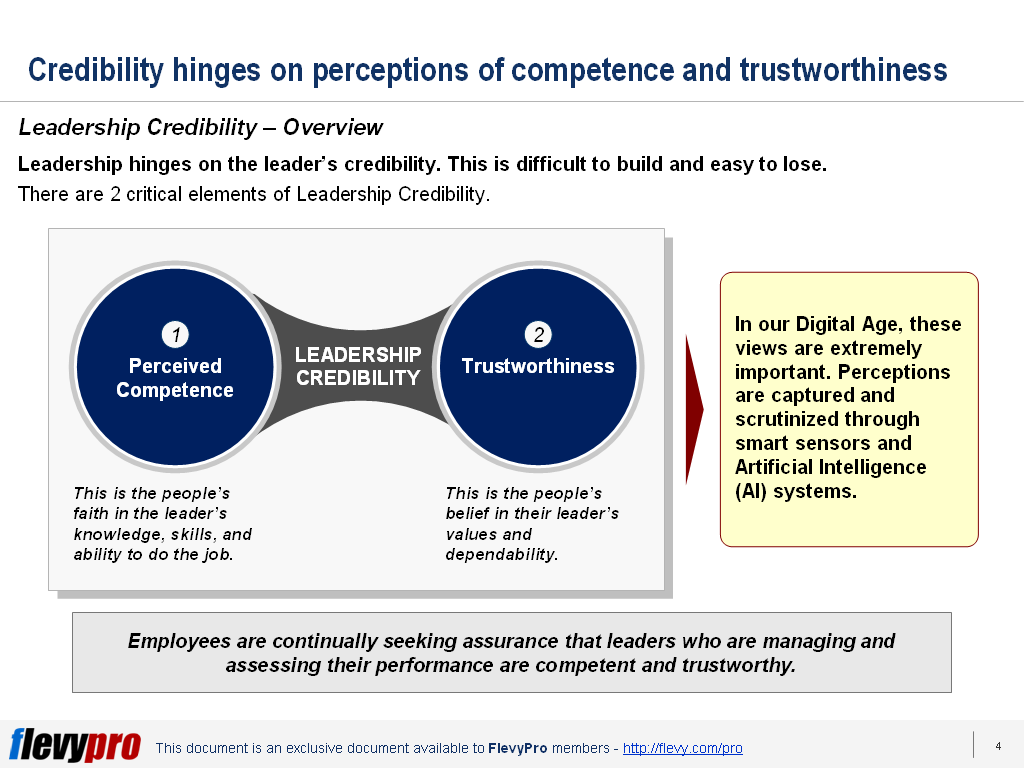Leadership is the relationship between people who aspire to lead and those who choose whether or not to follow. Leadership hinges on the leader’s credibility which is difficult to build and easy to lose.
the leader’s credibility which is difficult to build and easy to lose.
CEOs of BP, Wells Fargo and Volkswagen have learned that tough lesson through high-profile scandals that can swiftly damage their reputations. But what is at the heart of credibility?
A Purview of the Leadership Study
Over 3 years, Leadership Studies have been done to identify factors that can either underpin or undermine leadership credibility. Field studies were conducted using both quantitative and qualitative method. The studies identified what affects leaders’ credibility and how the leaders’ credibility influence employee behaviors and organizational outcome. The studies used a 9-point scale rating system that rate the leaders’ behaviors as indicators of competence and trustworthiness.
The first series of studies had a sample population of 146 employees in a variety of organizations. The studies were able to come up with a comprehensive model of Top Managers’ Credibility. It was able to identify leadership behaviors that generate perceptions of competence and trustworthiness.
Thereafter, cross-validation of the studies was conducted to a sample population of 145 employees in a variety of organizations. The cross-validation was able to identify the extent to which the behaviors identified in the first study indicate a leader’s competence or trustworthiness.
The 2 Critical Elements of Leadership Credibility
The Red Flag is UP
Eroding Leadership credibility is a deterrent to achieving our company’s goals and objectives. Organizations must strongly be alert on red flags that signal eroding credibility. Based on the study, there are various displays of incompetence our company must look out for.
- Lack of relevant job knowledge. Leaders lose credibility quickly when they struggle to handle key tasks that are part of the job, have difficulty answering questions about the organization, or make decisions that do not align with the organization or its broader environment.
- Failure to take action or ignore problems. Inability to take action and not being able to recognize problems is a sign of weak leadership. This can lead our company to fail to respond effectively to big changes in the environment. We will not be able to defend ourselves against competitors armed with new products, technologies, or strategies. We are left watching our sales and profits erode and our best people leave.
- Giving contradictory information. This is a bait towards creating a huge confusion in an organization that can cost us direly. Contradictory information is like swimming in a big body of water where none is clear and no direction can be seen. We can go this way, we can go that way and, in the end, we achieve nothing. Our company will forever be afloat in a sea of confusion.
- Requesting for irrelevant or unworthwhile information and reports. Extraneous requests can cause confusion in terms of the organization’s priorities and resources are put to waste.
In the end, these displays of incompetence can make our employees resentful of what they see as a waste of time and resources. Companies need to closely monitor actions that can erode a leader’s credibility. Knowing these red flags can already alert us to make the necessary changes.
There are Key Insights on Leadership Credibility that can prevent leaders from losing their credibility. One key insight is “The behaviors that help leaders gain or lose credibility are not always mirrored images of each other.” It is essential for our leaders to know and understand the key insights on leadership credibility. This way, we can avoid losing ours.
Interested in gaining more understanding of Building Leadership Credibility? You can learn more and download an editable PowerPoint about Building Leadership Credibility here on the Flevy documents marketplace.
Are you a management consultant?
You can download this and hundreds of other consulting frameworks and consulting training guides from the FlevyPro library.

Comments